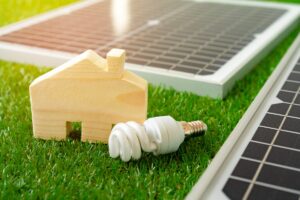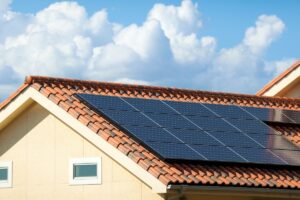How to Choose the Best Solar Panels for Your Home
Solar panels are becoming increasingly popular as a sustainable and renewable energy source. However, not all solar panels are created equal. In this section, we will discuss the different types of solar panels that are available in the market today from reputable and reliable installers such as Skylamp Solar. From the highly efficient monocrystalline solar panels to the versatile thin-film solar panels, we will explore the unique features and benefits of each type. By the end, you will have a better understanding of which solar panel is best suited for your energy needs.

1. Monocrystalline Solar Panels
Monocrystalline solar panels are a top choice for both residential and commercial use, thanks to their high efficiency and sleek design.
- Step 1: Determine your energy needs and calculate the necessary panel capacity.
- Step 2: Take your budget into account and compare the cost of monocrystalline panels with other types.
- Step 3: Conduct research on various brands and models to find the best quality and warranty options.
2. Polycrystalline Solar Panels
Polycrystalline solar panels offer a cost-effective option for harnessing solar energy. Here are the steps to consider when choosing polycrystalline panels:
- Assess your energy needs and determine the required wattage.
- Consider your budget and compare prices from different manufacturers.
- Research the efficiency, durability, and warranty of various polycrystalline panel models.
For optimal results, consult a solar panel expert to ensure the right fit for your home’s energy requirements.
3. Thin-Film Solar Panels
Thin-film solar panels are a type of solar panel that have distinct benefits and factors to consider. To select the best thin-film solar panel:
- Evaluate the efficiency levels and power output.
- Consider the size and weight of the panels for flexibility in installation.
- Assess the cost and compare it to other types of panels.
- Research the durability and lifespan of various thin-film panels.
4. BIPV Solar Panels
BIPV solar panels, also known as Building Integrated Photovoltaics, offer a unique solution for incorporating solar power into building structures. These panels serve a dual purpose as both a building material and a power generator, making them a popular choice for architects and developers seeking sustainable energy solutions in their designs.
What Are the Advantages of Using Solar Panels?
Solar panels have become increasingly popular as a sustainable energy option for homes and businesses. But what exactly makes them so advantageous? In this section, we will discuss the top benefits of using solar panels. From being a renewable energy source to providing cost savings on electricity bills, to being environmentally friendly and low maintenance, there are many advantages to incorporating solar panels into your energy system. Let’s take a closer look at each of these benefits and how they can positively impact your life and the environment.
1. Renewable Energy Source
- Determine the size and capacity of solar panels required to meet your renewable energy needs.
- Explore financing options or incentives for solar panel installation within your budget.
- Compare efficiency, warranty, and customer reviews of different brands and models of solar panels before making a decision.
2. Cost Savings on Electricity Bills
- Assess your current electricity usage to determine potential savings on your bills.
- Calculate the energy production of different solar panels to understand their cost-effectiveness in reducing costs.
- Consider the upfront cost of solar panel installation and compare it with long-term savings on your electricity bills.
- Explore available government incentives and rebates that can further reduce your electricity bills and increase your savings.
- Research financing options to make solar panel installation more affordable and save on future electricity bills.
Pro-tip: Regularly monitor your energy consumption and adjust your usage habits to maximize cost savings on electricity bills.
3. Environmentally Friendly
When it comes to solar panels, it is important to choose an environmentally friendly option. Here are some steps to consider:
- Research solar panel brands that prioritize sustainability, such as SunPower or LG Energy.
- Look for panels that have high energy efficiency ratings, meaning they can convert more sunlight into usable electricity.
- Consider the manufacturing process of the panels, opting for brands that use eco-friendly materials and production methods.
- Take into account the end-of-life disposal options for the panels, choosing ones that can be recycled or have a minimal environmental impact.
4. Low Maintenance
- Regular cleaning: Remove dust and debris from the solar panels using a soft cloth or brush.
- Check for damage: Inspect the panels for any cracks or damage and replace or repair as needed.
- Monitor performance: Keep an eye on the energy production to ensure it’s functioning optimally.
- Schedule professional maintenance: Consider hiring a professional to conduct periodic maintenance and inspections.
Solar panels have come a long way since their invention in 1954. With advancements in technology, they have become more efficient and durable, requiring minimal maintenance. Today, solar panels are a reliable and low-maintenance solution for generating clean and renewable energy.
What Are the Disadvantages of Using Solar Panels?
While solar panels have many benefits, there are also some drawbacks to consider before investing in this renewable energy source. In this section, we will discuss the potential disadvantages of using solar panels. From the high initial cost to the dependence on weather conditions, we will explore the key factors that may affect the efficiency and practicality of solar panels. By understanding these potential drawbacks, you can make an informed decision about whether solar panels are the right choice for your energy needs.
1. High Initial Cost
Despite the high initial cost, there are steps you can take to make solar panel installation more affordable:
- Research government incentives and tax credits that can offset costs.
- Consider financing options like solar loans or leases.
- Compare quotes from different solar installation companies.
- Opt for smaller systems or start with a few panels and expand gradually.
Remember, although there is a high initial cost, the long-term savings on electricity bills and the positive environmental impact make solar panels a worthwhile investment.
2. Dependence on Weather
When using solar panels, it is important to consider the dependence on weather. To mitigate this, follow these steps:
- Assess your location’s average sunlight hours and weather patterns.
- Invest in a solar panel system with high efficiency and tolerance to low light conditions.
- Install a battery storage system to store excess energy for cloudy days.
- Consider alternative energy sources, such as wind or hydro, for added reliability.
For example, you can install solar panels and a battery system, ensuring uninterrupted power even during rainy seasons.
3. Limited Efficiency
The limited efficiency of solar panels can be improved by taking these steps:
- Select high-efficiency panels with a higher power output per square meter.
- Take into account the orientation and tilt angle of the panels to maximize sunlight exposure.
- Install a solar tracking system that follows the movement of the sun for optimal energy generation.
- Maintain and clean the panels regularly to prevent efficiency losses caused by dirt or debris.
4. Requires Space for Installation
When considering solar panels, it’s important to keep in mind that their installation requires a significant amount of space. It is crucial to ensure that you have enough roof or ground area available to accommodate the panels for optimal energy production. It is recommended to plan accordingly and consult with professionals to determine the appropriate amount of space needed for installation.

How to Choose the Right Solar Panel for Your Home?
If you’re considering switching to solar energy for your home, it can be overwhelming to navigate the many options available. The key to finding the right solar panel for your specific needs is to carefully consider your energy requirements, budget, and available brands and models. In this section, we will guide you through the process of choosing the perfect solar panel for your home by discussing the important factors to consider. From determining your energy needs to researching different brands and models, we have you covered.
1. Determine Your Energy Needs
- Assess your current energy consumption by examining your electricity bills.
- Consider your future energy needs by factoring in any planned changes or additions to your home.
- Identify your energy goals, such as reducing your carbon footprint or becoming completely energy-independent.
- Consult with a solar panel professional or use online calculators to determine the size of the solar panel system required to meet your energy needs.
- Take into account your available roof space or other suitable areas for solar panel installation.
2. Consider Your Budget
- Evaluate your financial situation and determine how much you can afford to spend on solar panels.
- Research different brands and models to get an idea of the price range and features available.
- Consider your budget and long-term savings when comparing costs and return on investment.
- Explore financing options such as solar loans or leasing to make the upfront cost more manageable.
Remember, while it’s important to consider your budget, don’t compromise on the quality and efficiency of the solar panels. Look for reputable brands that offer a good balance of affordability and performance.
3. Research Different Brands and Models
When researching different brands and models of solar panels, follow these steps:
- Determine your energy needs and calculate the required system capacity.
- Consider your budget and find options that align with your financial goals.
- Research different brands and models, comparing their efficiency, durability, warranties, and customer reviews.
Conclusion
Choosing the best solar panels for your home is a significant decision that can lead to both environmental and financial benefits. By understanding your energy needs, considering panel quality and efficiency, and taking advantage of incentives, you can make an informed choice that aligns with your goals. Remember that investing in solar panels is not just about saving money; it’s about contributing to a more sustainable future.
